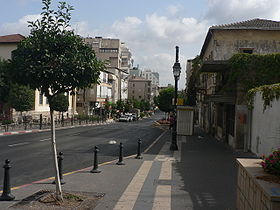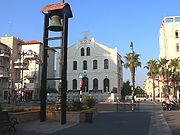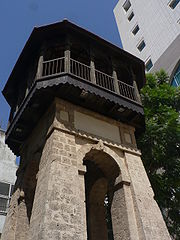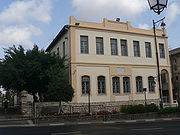Rishon LeZion
| Rishon LeZion | ||
 |
||
|
||
| Hebrew | רִאשׁוֹן לְצִיּוֹן | |
| (Translit.) | Rishon LeTziyon | |
| Name meaning | First to Zion | |
| Founded in | 1882 | |
| Government | City (from 1950) | |
| Also spelled | Rishon LeZiyyon (officially) | |
| District | Center | |
| Population | 224,300 (2007) | |
| Jurisdiction | 58,704 dunams (58.704 km2/22.666 sq mi) | |
| Mayor | Dov Tzur | |





Rishon LeZion (Hebrew: רִאשׁוֹן לְצִיּוֹן (audio), lit. First to Zion), is the fourth-largest city in Israel, located along the central Israeli coastal plain. It is part of the Gush Dan metropolitan area with a population of 224,300 at the end of 2007.[1] Rishon LeZion was founded in 1882 by Russian immigrants and was the second Jewish settlement to be formed in Israel after Petah Tikva. Today the city acts partly as a commuter town for Tel Aviv, but does have its own industries as well. The mayor of Rishon LeZion is Dov Tzur.
Contents |
Etymology
The name Rishon LeZion is derived from a biblical verse: "First to Zion are they, and I shall give herald to Jerusalem" (Hebrew: ראשון לציון הנה הינם, ולירושלים מבשר אתן) (Book of Isaiah 41:27) and literally translates as the First to Zion.
History
Rishon LeZion was founded on July 31 1882 by a group of ten Hovevei Zion pioneers from Kharkov, Ukraine (then the Russian Empire) headed by Zalman David Levontin. Reuven Yudalevich is thought to be another of these ten pioneers. The group purchased 835 acres (3.4 km²) of land southeast of present-day Tel Aviv, near the Arab village of Ayun Kara. Other notable founders of Rishon include Israel Feinberg as well as Yossef Feinberg, a chemist, Zeev Abrahamovich, Yehuda Hankin, and Zvi Ha-Cohen Levontin. Rishon LeZion was the second modern settlement in Palestine, the first being Petah Tikva, which was deserted and then reestablished.
The pioneers who founded Rishon faced numerous difficulties. The soil was sandy, water was scarce and the settlers had no agricultural experience. After a well was dug and more pioneers arrived - the Biluim - the colony slowly took shape. Notable members of this group include Fani Belkind, Israel Belkind, Shimshon Belkind, Yoel Drubin, Dr. Haim Hissin, and David Yudilovich. When Baron Edmond James de Rothschild took over, sending in his administrators, major progress was made in the spheres of agriculture, citrus and viticulture. Under Rothschild's patronage, the Carmel-Mizrahi Winery was established in 1886. David Ben-Gurion was head of workers' union at the winery before later becoming Israel's first prime minister.
The first modern Hebrew school in the country opened in the city in 1886, and the first Hebrew kindergarten in 1899. The population numbered 359 in 1890. Five years later it increased to 380, and by 1900 rose to 526. Eliezer Ben-Yehuda, the father of modern Hebrew, worked as a teacher in Rishon LeZion, whilst Dov Lubman Haviv was a teacher in the first Hebrew school here, and Mordechai Lubman Haviv was an educational inspector.
In 1911, Rishon had 4,000 dunams of vineyard in comparison to 254 dumans of orchards.[2]
Development of the town was hindered continually, however, by the fact that no water was found there until Baron Rothschild brought in experts who located water at 42 meters below ground. The groundwater table in the area was found to be uneven and wells were mostly constructed at between 20 and 25 meters in depth. Orchards were then developed around the settlement, and by the late 1920s the city developed a burgeoning citrus industry.[2]
Rishon was designated a city in 1950 and, by 1983 Rishon LeZion had grown to have a population of 103,000. By 2006, this had risen to 222,300. By 2020, the city is expected to have a population of 315,000.[3] In 2007, the Rishon LeZion Municipality was awarded the Ministry of Interior Prize for Proper Management.[3]
Economy
Rishon Lezion's main industries today are wine, construction, services and commerce. Factories and workshops are located in the industrial zone, which has become a popular venue for pubs, dance clubs and restaurants. Industry in the city is largely divided into two industrial centers: the old industrial zone in the north of the city and the new industrial zone in the west of the city.[3] The two major malls in Rishon LeZion are Rothschild Center in the old downtown center and Gold Mall (Kanyon ha-Zahav) in the New West district. IKEA are expected to open a branch in the city, its second in Israel, in the Maayan Sorek area, whilst companies such as Coca Cola, Gazit Globe, Volvo and Fiat are also expected to open in this area.[3]
As part of the city's 5 year plan to be completely water-independent[4], construction of a desalination plant is planned for Rishon which will produce 3.7 million cubic meters of water per year, whilst the city already hosts the large Shafdan recycling plant.[3]
Tourism
As one of the earliest settlements to be established in Israel, Rishon LeZion is home to a number of tourist attractions including a history museum, the Carmel Winery and Beit Yad LaBanim - the administrative center of Baron Rothschild, now a soldiers' memorial. Furthermore, the city has a mall called Midrachov, a concert hall, Heichal HaTarbut, and an amusement park; Superland. The Great Synagogue, Great Well, Old Water Tower, and First Hebrew School (Beit Sefer Haviv) are also regularly visited by tourists.
Culture
The city, often called Rishon (or Rashlatz, the Hebrew acronym for Rishon LeZion, in written material), hosts the annual Rishon LeZion Wine Festival. Rishon is also known for its numerous shopping centers, its Amphitheatre which hosted musical acts such as Sting, Metallica, Alanis Morissette and Sean Paul, a zoo, an amusement park (Superland), and its beach promenade.
Heichal HaTarbut (Hall of Culture) is a large and highly reputed modern center for classical concerts, theatre performances and cultural events. It has a larger theatre for shows and two smaller ones for artistic workshops.
The Israel Symphony Orchestra Rishon Lezion, directed by Dan Ettinger, has participated in music festivals all over the world. It was awarded the ACUM prize in 1991.
Rishon's Parliament
The "Rishon's Parliament" was a famous group of Rishon's elders and veterans who were known for their wit and unique style. The group used to assemble about three times a week to discuss current events and exchange anecdotes and jokes. Their stories were documented by Uri Porat and Amnon Nahmias and published in a series of stories in Yediot Aharonot and later in a book called Rishon - The Wild East.
Education
Rishon LeZion has twenty-three elementary schools, nine middle schools and twelve high schools. Rishon Lezion's College of Management has a student population of 10,000.[3]
Rishon hold the first all Hebrew school (Haviv school) and kindergarten. It has the 5th highschool in Israel, HaGymnasia HaRealit, which was founded in 1939 and considered among the best highschools in Israel.
Sports
Rishon Lezion is known for its achievements in handball and chess. In handball, Hapoel Rishon LeZion and Maccabi Rishon LeZion dominate the handball league. Hapoel has won more than seven domestic championships and cups in a row, with stars like goalkeeper Vladimir Zaikman and field-players Idan Maimon and Dudi Balsar. Its biggest rival, Maccabi, has a rich history as well, and was able to take the championship title from Hapoel in the latest 2005/06 season. Handball is also a dominant sport in Rishon LeZion high schools. The Amit Amal high school handball team has won the world championship several times.
In chess, the Rishon LeZion Chess Club, founded in 1939, is one of the leading clubs in Israel, in senior, women and youth leagues. Israeli grandmasters such as Boris Alterman play for Rishon. World champion Garry Kasparov was a former member.
As to the two most popular sports in Israel, football and basketball, Rishon has achieved certain accomplishments as well. Ironi Rishon LeZion has spent several seasons in the top division, but has experienced a decline in recent years and have been relegated to Liga Artzit, the third tier.
The Maccabi Rishon LeZion basketball team is a long-time member of Ligat HaAl, the top division. The team was a stubborn rival to Israel's top club and European champion, Maccabi Tel Aviv, during the 1990s. After a certain decline in the beginning of the 2000s, the club is trying to get back its place in the top positions of the first division league. With the support of Rishon high schools, the club has been known to produce some very talented basketball players over the years.
Transport
Rishon LeZion can be accessed by road from several major highways. Public transportation includes bus, train and share taxi.
Rail transport
The Rishon LeZion HaRishonim Railway Station is located to the south of the city center. It is accessible from the centern and eartern neighborhoods by several bus lines operated by Egged, Dan and Superbus. The western neighborhoods are connected to the railway station by Egged line 17a (in mornings and noons also by Dan lines 19 and 129), and by private transport using the new Route 431.
There are direct trains from the HaRishonim Railway Station to Tel Aviv, Lod, Bnei Brak, Petah Tikva, Rosh HaAyin, Hod HaSharon and Kfar Saba. All stations of Israel Railways can be accessed using the transfer stations at Tel Aviv and Lod.
Bus transport
The bus companies operating in Rishon LeZion are:
- Egged with lines to Jerusalem, Tel Aviv, Holon, Bat Yam, Petah Tikva, Ramat Gan, Bnei Brak, Rehovot, Ness Ziona, Ashkelon, Kiryat Mal'akhi, Yavne, Ramla, Eilat and other destinations
- Dan with lines to Holon, Bat Yam and Tel Aviv
- Connex with lines to Modi'in, Yavne, Ashdod and intermediate communities. In addition, Connex line 314 connects Tel Aviv to Rishon LeZion one way, and Connex line 315 connects Bar Ilan University, Tel HaShomer and Ramat Gan to Rishon LeZion one way.
- Metropoline which operates lines to Be'er Sheva via Kiryat Mal'akhi, Kiryat Gat, Yavne and intermediate communities. Metropoline lines also reach Tel Aviv, Rehovot and Ness Ziona, though Egged lines are much more frequent for these destinations.
- Superbus which operates a line to Ramla via Be'er Ya'akov
- Kavim with lines to Or Yehuda, Yehud, Kiryat Ono and Tel HaShomer
Share taxis also operate in the city, connecting it with neighboring localities as well as Tel Aviv. Unlike buses, they are also active on Saturdays and Jewish holidays.
Rishon LeZion has a bus network operated by the Egged company with the addition of Dan lines 19 and 129. Bus lines underuse highways and mostly pass the city center bottleneck. The bus lines are augmented by share taxis operated by Moniyot HaIr. Most share taxi lines are almost identical to bus lines.
Geography
Topography and climate
Rishon LeZion is located on the Israeli Mediterranean Coastal Plain and the northern Shephelah.
The city experiences hot, dry summers, and colder, wetter winters.
| Month | Jan | Feb | Mar | Apr | May | Jun | Jul | Aug | Sep | Oct | Nov | Dec | |
|---|---|---|---|---|---|---|---|---|---|---|---|---|---|
| Average high °C (°F) | 23 (74) |
27 (80) |
31 (87) |
35 (95) |
37 (99) |
36 (97) |
33 (92) |
33 (91) |
33 (92) |
33 (92) |
31 (87) |
26 (79) |
|
| Average low °C (°F) | 1 (34) |
2 (36) |
3 (37) |
6 (42) |
8 (47) |
13 (55) |
16 (60) |
17 (62) |
15 (59) |
10 (50) |
6 (43) |
2 (36) |
|
| Precipitation mm (inches) | 139.7 (5.5) |
88.9 (3.5) |
61 (2.4) |
20.3 (0.8) |
2.5 (0.1) |
0 (0) |
0 (0) |
0 (0) |
0 (0) |
27.9 (1.1) |
73.7 (2.9) |
144.8 (5.7) |
|
| Source: The US Weather Channel[5] 2008-11-23 | |||||||||||||
Neighborhoods
Rishon LeZion can be divided into four main quarters: the old city, the eastern housing projects, the northern (old) industrial zone, and Western Rishon LeZion. There is also an industrial zone on the southern tip of the city, next to Gan Sorek.
Old city
The old city of Rishon includes the original neighborhoods, some buildings dating back to Rishon's founding in 1881. This quarter is located in the city center, between and around Herzl and Jabotinsky Streets. It includes the following neighborhoods:
- Nahalat Yehuda (on the northernmost tip of Rishon)
- Neve Hillel
- Bnot Hayil
- Abramovich
- Katzenelson
- Remez (a.k.a. Giv'at Levinson), on the southwestern tip of old Rishon
- Rishonim (a.k.a. Gan Nahum), to the east of Remez
Eastern Housing Projects
The Eastern Housing Projects (Hebrew: שיכוני המזרח Shikunei HaMizrah) was Rishon's quick expansion to the east. It is dominated by the housing projects (shikunim) there, in the Shikunei HaMizrah neighborhood itself. Other smaller neighborhoods include:
- Revivim
- Kidmat Rishon
- Ne'urim
- Rambam
- Neve Hadarim
- HaShomer
- Kfar Arye
- Mishor HaNof
- Kiryat Simha
The eastern projects stopped developing when they reached the fences of the Tzrifin military base. When Tzrifin will be sold to private contractors as planned, this quarters is expected to expand significantly with new lucrative housing projects.
Old Industrial Zone
The industrial zones in Rishon LeZion are called Mabat, an abbreviation for Miskhar, Bilui VeTa'asiya (Commerce, Pastime and Industry). The northern zone is the oldest and original industrial zone, once full of light industry and glass factories. Today, it is known for its prolific nightlife.
West Rishon
West Rishon LeZion is the conglomeration of the new neighborhoods of the city, built in the 1980s and 90s. The west also has higher land value because of its relative proximity to the Mediterranean Sea. It includes the entire city west of Tzahal Road. The quarter includes the new industrial zone (Western Mabat), and a number of residential neighborhoods:
- Neve Elyahu
- Ne'ot Shikma
- Neve Dekalim
- Neve Hof
- Neve Yam
- Kiryat Rishon
- Kiryat Cramim
- Kiryat Ganim
- Ne'ot Ashalim
- Kiryat Hatanei Pras Nobel (lit. Nobel Price Recipient Town)
Mayors of Rishon LeZion
- Eliakum Ostashinski (1950-1951)
- Arie Sheftal (1951)
- Moshe Gavin (1952-1955)
- Gershon Man Mankov (1955)
- Hana Levin (1955-1960)
- Arie Sheftal (1960-1962)
- Noam Laoner (1962-1965)
- Arie Sheftal (1965-1969)
- Hananya Gibstein (1969-1983)
- Meir Nitzan (1983-2008)
- Dov Tzur (2008-present, mayor elect)
Notable residents
- Tal Ben Haim, Manchester City F.C. footballer
- Zohar Argov, singer
- Boris Gelfand, chess champion
Sister Cities
References
- ↑ "Table 3 - Population of Localities Numbering Above 1,000 Residents and Other Rural Population". Israel Central Bureau of Statistics (2008-06-30). Retrieved on 2008-10-03.
- ↑ 2.0 2.1 Karlinsky, Nahum; Greenwood, Naftali (2005). California Dreaming: Ideology, Society, and Technology in the Citrus. SUNY Press. pp. p. 54. ISBN 0791465276. http://books.google.com/books?id=cdvgiXjvgLcC&pg=PA54&dq=rishon+lezion&ei=NVr3R--iHKHayAT_u82WCg&sig=m1vg58XE3XdwpEs3cjwVsetXuJ4. Retrieved on 2008-04-05.
- ↑ 3.0 3.1 3.2 3.3 3.4 3.5 "Municipality of Rishon LeZion Profile". Israel's Largest Enterprises 2008. Dun's 100. Retrieved on 2008-04-05.
- ↑ Green, Michael (16 October 2008). "Dig It!". The Jerusalem Post. Retrieved on 2008-11-23.
- ↑ "Monthly Averages for Rishon LeZiyyon". Weather.com. Retrieved on 2008-11-23.
External links
- Rishon LeZion City Hall (Hebrew)
- Rishon LeZion Portal (Hebrew)
|
||||||||||||||||